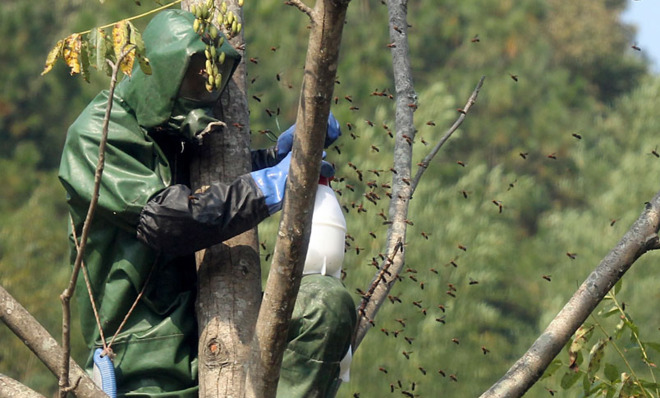Watch the Chinese military attack killer wasps with a flamethrower
The People's Liberation Army goes to war with the Asian giant hornet

A free daily email with the biggest news stories of the day – and the best features from TheWeek.com
You are now subscribed
Your newsletter sign-up was successful
The Chinese military has come up with a simple solution to the nation's plague of killer wasps: Burn them. Burn them all.
The scorched-earth tactic was recently deployed in the village of Jiangjin Tsz Wan Yuen Tsuen, which had been terrorized by a swarm of Asian giant hornets. Perched 100 feet up a tree and surrounded by rugged terrain, the hornets' five-foot-wide nest — whose occupants had already stung one man to death and injured many more — was impervious to attack by villagers. Desperate locals called in the People's Liberation Army, which arrived with a military-issue flamethrower.
Video from the ensuing bug battle shows officers dressed in camouflage and wearing gas masks, as if they were about to enter a war zone. Following a quick survey of the area, the troops shot a jet of fire into the tree. After a couple more blasts, the nest was engulfed in flame.
The Week
Escape your echo chamber. Get the facts behind the news, plus analysis from multiple perspectives.

Sign up for The Week's Free Newsletters
From our morning news briefing to a weekly Good News Newsletter, get the best of The Week delivered directly to your inbox.
From our morning news briefing to a weekly Good News Newsletter, get the best of The Week delivered directly to your inbox.
"The wasp nest was quite big," the unit's commander told local journalists, according to RocketNews24.com. "It would be difficult to remove, so after having a meeting to discuss the nest, it was decided that the best course of action would be to take it down with a flame thrower."
The decision to treat the black-and-yellow bugs like hostile combatants is understandable. The Asian giant hornet — which can grow to 1.5 inches in length — carries venom that destroys red blood cells, potentially resulting in kidney failure and death.
But a bigger danger than the toxicity of the venom, say scientists, is allergy. Insect stings can cause an anaphylactic reaction in some people, which may result in airway closure or a heart attack. Since July, these hornets have killed at least 42 people in China's central Shaanxi province and left 1,675 more needing medical treatment.
Mu Conghui, a 55-year-old farmer, told The Guardian that she was stung 200 times while working in her rice field in August. "These hornets are terrifying — all at once they flew to my head, and when I stopped, they stung me so much that I couldn't budge," she said. "Right now my legs are covered with small sting holes. Over the past two months I've received 13 dialysis treatments."
A free daily email with the biggest news stories of the day – and the best features from TheWeek.com
Some experts have blamed the spate of attacks on climate change: The past year has been unusually warm in Shaanxi, allowing a high number of hornets to survive the winter. Rapid urbanization in the province has also led to a decrease in the hornets' natural predators, such as spiders and birds.
"In other words, it's a good season for the hornet population," said Madison Park at CNN, "which makes it a bad season for people who encounter them."
Theunis Bates is a senior editor at The Week's print edition. He has previously worked for Time, Fast Company, AOL News and Playboy.